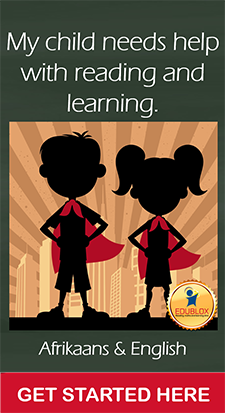

It is important to note that learning is a step-by-step process in which one skill has to be acquired first before you can acquire the next. It is like climbing a ladder; if you miss one of the rungs you could fall off. With this in mind, children need to be guided through the steps of learning in order to correctly develop the skills they need to be successful.
Reading is one of the main building blocks of learning at school. A child who struggles to read, will struggle to learn; and a child who struggles to learn will battle to cope at school and later on, at life. However, there are certain foundational skills upon which reading is based that a child must master before he can learn to read. “Language (verbal) skills comprise the first rung of the learning ladder,” says Susan du Plessis of the Edublox reading and learning clinic. “A child needs to have developed good language skills before learning to read; if language skills are developed correctly, a large proportion of reading difficulties can be prevented.”
Reading difficulties are also associated with under-developed non-verbal cognitive skills. “Non-verbal cognitive skills comprise the second rung of the learning ladder,” du Plessis continues. “These include concentration, visual discrimination, accurate observation and memorisation, skills of association and auditory memory. These are functions that should be taught at pre-school level to form the foundation of good reading, writing and arithmetic. If your child’s verbal and non-verbal skills are strong, then they will cope well with reading and other school activities,” she explains.
So what can be done to ensure that your child is developing the correct verbal and non-verbal skills required to excel? Research has proven the vital role that parents play in their child’s educational achievement. Parents need to provide as many enriching experiences during their child’s first years of life as possible. “They should start talking to their baby from the day that they are born,” says du Plessis. “Babies learn language in one way only, and that is through listening to their parents speaking to them. Research has shown that a child who is just beginning to speak must hear a word around 500 times before it will become part of his active vocabulary. The more a parent talks to a child, often repeating the same words, phrases, or sentence structures, the sooner the child will learn language,” du Plessis continues.
“Parents should also read to their children as often as possible and start teaching them nursery rhymes once they are a little older. Research has shown that knowledge of nursery rhymes among three-year-olds was a significant predictor of pre-reading skills later on, even after the child’s IQ and their mothers’ educational levels were factored out.”
“Additionally, teaching children to discriminate between left and right is a visual discriminatory skill that plays a very important role in reading and needs to be taught, from infancy, through extensive repetition, until it becomes automatic,” du Plessis says.
“Improve your child’s memory by playing simple but fun memory games. Once children start school they need to memorise everything from the alphabet to multiplication facts. Playing memory games during the pre-school years will help improve their memories in a fun manner.”
“Sending children on a structured school readiness programme can help to prepare them for the challenges of primary school,” du Plessis continues. “Such a programme will ensure that they have mastered the learning steps that they will need prior to beginning their primary school syllabus. Edublox offers multi-sensory cognitive enhancement classes aimed at developing foundational learning skills. Our classes prepare pre-schoolers and school beginners for learning to read, write and do arithmetic.”






Leave a Reply